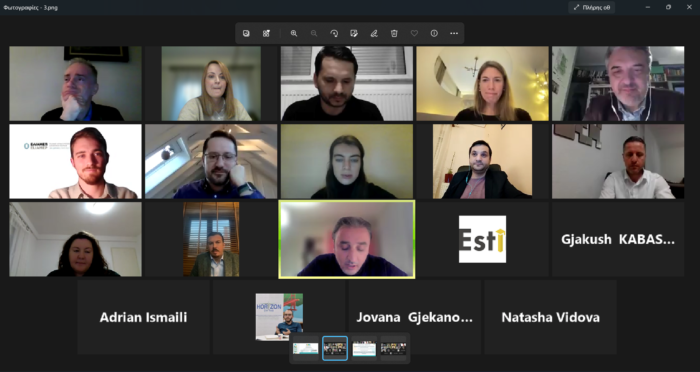The South-East Europe Programme of ELIAMEP organized the 2nd Meeting with stakeholders from North Macedonia. This online event was held in the context of the research project PAVE -Preventing and Addressing Violent Extremism through Community Resilience in the Balkans, the Middle East, and North Africa – which has received funding from the EU’s Horizon 2020 research and innovation programme. The PAVE research team of ELIAMEP, notably Ioannis Armakolas, Yorgos Christidis and Bledar Feta, met with representatives from various types of institutions from North Macedonia to discuss and consult on the findings from the fieldwork research on cumulative extremism, and on online and offline (de)radicalization, the team conducted in two cities in North Macedonia, notably Tetovo and Kumanono, in July 2021. Participants in the meeting included, state-based stakeholders such as senior officials from the Committee for Countering Violent Extremism and Terrorism in North Macedonia and the Municipality of Kumanovo, a representative from the Islamic Religious Community, international country-based stakeholders such as a representative from the US Embassy in Skopje, the Council of Europe (CoE), and the International Organization for Migration (IOM), PhD students and members of NGOs, CSOs and think tank actively engaged in P/CVE.
The online meeting was divided into two parts. In the first part, the research team of ELIAMEP made a short presentation of the PAVE project, its main objectives, the regions involved, and the general scope of the work packages ELIAMEP is involved. They proceeded with the presentation of the methodology and the research approach they followed during the fieldwork in North Macedonia which included 29 interviews with different stakeholders and 4 focus-group discussions. This was followed by an extensive presentation of the key findings from the fieldwork, including the most significant factors of community resilience and vulnerability to cumulative extremism, the online and offline narratives used by extremist groups, and the role that religious leaders, the civil society, the local institutions, the diaspora, and the international community play in hindering or increasing community resilience. Cross-cutting issues such as the influence of war legacy and the role of gender were also thoroughly assessed. In the second part of the meeting, the floor was given to the stakeholders in order to comment on the finding from their perspective. Participants discussed in depth the results and exchanged views and inputs. One important issue touched during the discussion was the significant role that religious leader can play in building resilience in their communities. Another topic introduced by the members of the civil society was the low capacity to transform project-based initiatives into policy-making processes in North Macedonia. In general, it was pointed out the necessity to generate successful P/CVE projects into policy-making initiatives that can perform beyond external ownership. At the end of the meeting, participants expressed their willingness to read the final working papers and the respective recommendations produced in the context of PAVE project.






